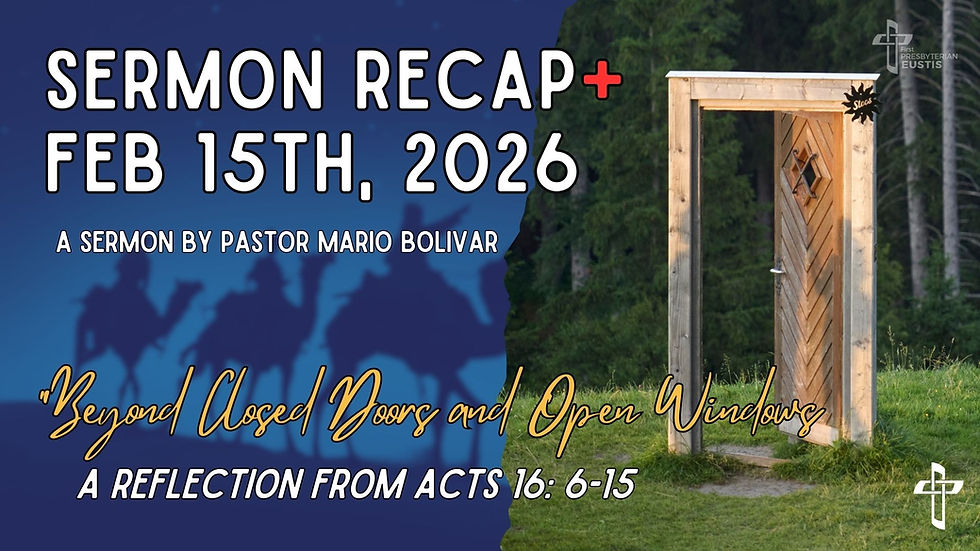Sermon Recap+ Sept 7, 2025
- Mario Bolivar
- Sep 9, 2025
- 4 min read
Psalm 139 is one of the most beautiful passages in Scripture, describing God's intimate knowledge of us, His constant presence, and His unlimited power. But there's a section many of us tend to skip over - the part where David expresses his anger and hatred toward the wicked. What do we do with these difficult verses? How do we reconcile David's expressions of anger with the loving God he describes earlier in the psalm?
Understanding the Three Attributes of God in Psalm 139
The first 18 verses of Psalm 139 beautifully describe three key attributes of God:
Omniscience (verses 1-6): "O Lord, you have searched me and known me." God knows everything about us - our thoughts, actions, and words before we even speak them.
Omnipresence (verses 7-12): "Where can I go from your spirit?" There is nowhere we can go to escape God's presence - not in the heights of heaven, the depths of the sea, or even in darkness.
Omnipotence (verses 13-18): "For it was you who formed my inward parts." God's power is displayed in His creation of us, knitting us together in our mother's womb.
Who Was David and Why Does His Context Matter?
To understand Psalm 139 fully, we need to know who David was. He began as the youngest son of Jesse - essentially a nobody in a culture where the oldest son received all privileges. As the youngest, David was assigned to shepherd duty, living outside with the sheep. When the prophet Samuel came looking for Israel's next king, he passed over all of David's older brothers until finding David himself. Even after being anointed as the future king, David continued serving humbly, taking food to his brothers at the battlefield.
It was there that David encountered Goliath. While others cowered in fear, David stepped forward in faith. This wasn't just bravery - David was "capable of great violence" but chose to use that capability in service to God.
How Did David Handle His Anger?
Later, when King Saul became jealous and repeatedly tried to kill David, David had multiple opportunities to take Saul's life. In 1 Samuel 24, we see David secretly cutting off a piece of Saul's robe while Saul was vulnerable in a cave. Even this small act troubled David's conscience, and he prevented his men from harming Saul. This is the context for understanding Psalm 139:19-22, where David expresses his hatred for God's enemies: "Oh, that you would kill the wicked, O God... Do I not hate those who hate you, O Lord?" David wasn't acting on this hatred. Instead, he was bringing his raw emotions honestly before God. And notice how the psalm ends - with a prayer for God to search his heart and remove any wickedness from him.
What Should We Do With Our Anger?
Anger itself isn't sinful - it's a natural human emotion that signals something is wrong. The danger comes in how we react to that anger. "Danger and anger are just one letter apart." If we don't channel our anger constructively, it leads to danger. But when we acknowledge our anger and bring it to God, He can transform it into positive action.
A few months ago... After reading a disturbing news story about child abuse, I felt intense anger toward the perpetrators. Rather than letting that anger consume me or acting on violent impulses, my wife and I decided to channel those feelings into something constructive - beginning the process of adoption. We couldn't save every child, but we could provide a loving home for one.
Why Is Honesty About Our Feelings Important?
Many of us were raised to perform, to produce, to keep working regardless of how we feel. We believe our value comes from what we do rather than who we are. This is especially true for parents who feel they must constantly give without receiving. But our value isn't in performing - it's in accepting our limits and being honest about our feelings. When we express how we're truly feeling to those around us, they can help us achieve centeredness, purpose, and dwelling in God's kindness.
How Does God Respond to Our Honest Emotions?
The beautiful truth of Psalm 139 is that God already knows everything about us - including our darkest thoughts and strongest emotions. There's no place we can hide from Him, not as a threat but as a comfort. We're never too far to be found. Like a baby who cries knowing someone will listen, we can bring our raw emotions to God, trusting He will hear us. The God we praise understands our brokenness and doesn't reject us but says, "Let me repurpose that energy, that anger, that frustration, that brokenness, and give you new life."
Life Application
This week, I challenge you to practice emotional honesty - first with yourself, then with God, and finally with those closest to you. When you feel anger rising, don't suppress it or immediately act on it. Instead:
Acknowledge the feeling: "I am feeling angry right now."
Bring that emotion honestly before God in prayer.
Ask God to help you channel that energy constructively.
Consider what positive action you might take to address the underlying issue.
Ask yourself these questions:
What emotions am I reluctant to bring before God?
How might my anger be pointing to something that needs to change?
In what ways could God repurpose my strongest emotions for good?
Remember, "God doesn't require perfection, but participation." David wasn't afraid to show his true self to God, and God blessed him for it. Be honest with yourself, with those around you, and with God - and watch what God does in the world through you.





Comments